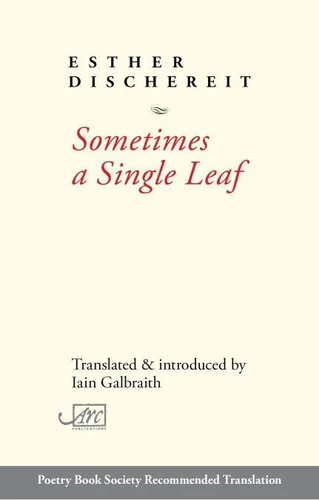Sometimes a Single Leaf
Par : ,Formats :
Disponible dans votre compte client Decitre ou Furet du Nord dès validation de votre commande. Le format ePub est :
- Compatible avec une lecture sur My Vivlio (smartphone, tablette, ordinateur)
- Compatible avec une lecture sur liseuses Vivlio
- Pour les liseuses autres que Vivlio, vous devez utiliser le logiciel Adobe Digital Edition. Non compatible avec la lecture sur les liseuses Kindle, Remarkable et Sony
 , qui est-ce ?
, qui est-ce ?Notre partenaire de plateforme de lecture numérique où vous retrouverez l'ensemble de vos ebooks gratuitement
Pour en savoir plus sur nos ebooks, consultez notre aide en ligne ici
- Nombre de pages136
- FormatePub
- ISBN978-1-911469-72-8
- EAN9781911469728
- Date de parution06/01/2020
- Protection num.pas de protection
- Taille2 Mo
- Infos supplémentairesepub
- ÉditeurArc Publications
Résumé
Whether in poetry, fiction, radio drama or sound installations, Esther Dischereit's work represents a unique departure in recent European writing: a distinctive, off-beat syntax of German-Jewish intimacy with the fractured consciousness and deeply rutted cultural landscape of today's Germany. Sometimes a Single Leaf, mirroring the development of Esther Dischereit's poetry across three decades, includes selections from three of her books as well as a sampling of more recent, uncollected poems.
It is her first book of poetry in English translation. In the words of her translator: "Esther Dischereit's poetry offers a visceral pathography of post-war continuities, spectres, amnesia and trauma. Her work builds on the poet's vulnerability and witness to a previous and ultimately un-sealable dimension - a dimension inhabited in a different way by the poetry of Paul Celan - in which the violations and degradation of the Shoah resonate with harrowing persistence in the detail of contemporary everyday life.
At the same time, however, her poems test moments of personal and poetic redress, espousing forms developed in an incessant exploration of speech rhythms and images, celebrating the erotic and quotidian, experimenting with hope, seeking community."
It is her first book of poetry in English translation. In the words of her translator: "Esther Dischereit's poetry offers a visceral pathography of post-war continuities, spectres, amnesia and trauma. Her work builds on the poet's vulnerability and witness to a previous and ultimately un-sealable dimension - a dimension inhabited in a different way by the poetry of Paul Celan - in which the violations and degradation of the Shoah resonate with harrowing persistence in the detail of contemporary everyday life.
At the same time, however, her poems test moments of personal and poetic redress, espousing forms developed in an incessant exploration of speech rhythms and images, celebrating the erotic and quotidian, experimenting with hope, seeking community."
Whether in poetry, fiction, radio drama or sound installations, Esther Dischereit's work represents a unique departure in recent European writing: a distinctive, off-beat syntax of German-Jewish intimacy with the fractured consciousness and deeply rutted cultural landscape of today's Germany. Sometimes a Single Leaf, mirroring the development of Esther Dischereit's poetry across three decades, includes selections from three of her books as well as a sampling of more recent, uncollected poems.
It is her first book of poetry in English translation. In the words of her translator: "Esther Dischereit's poetry offers a visceral pathography of post-war continuities, spectres, amnesia and trauma. Her work builds on the poet's vulnerability and witness to a previous and ultimately un-sealable dimension - a dimension inhabited in a different way by the poetry of Paul Celan - in which the violations and degradation of the Shoah resonate with harrowing persistence in the detail of contemporary everyday life.
At the same time, however, her poems test moments of personal and poetic redress, espousing forms developed in an incessant exploration of speech rhythms and images, celebrating the erotic and quotidian, experimenting with hope, seeking community."
It is her first book of poetry in English translation. In the words of her translator: "Esther Dischereit's poetry offers a visceral pathography of post-war continuities, spectres, amnesia and trauma. Her work builds on the poet's vulnerability and witness to a previous and ultimately un-sealable dimension - a dimension inhabited in a different way by the poetry of Paul Celan - in which the violations and degradation of the Shoah resonate with harrowing persistence in the detail of contemporary everyday life.
At the same time, however, her poems test moments of personal and poetic redress, espousing forms developed in an incessant exploration of speech rhythms and images, celebrating the erotic and quotidian, experimenting with hope, seeking community."



